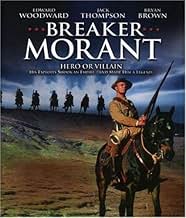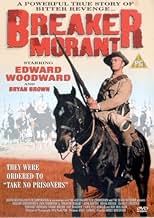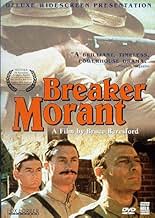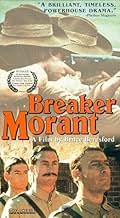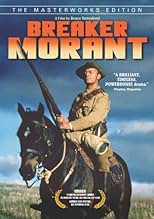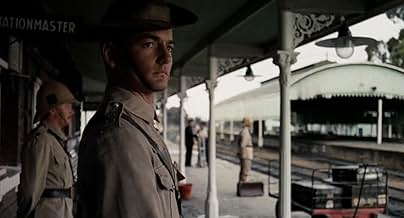PUNTUACIÓN EN IMDb
7,8/10
15 mil
TU PUNTUACIÓN
Tres tenientes australianos son sometidos a un consejo de guerra por ejecutar a prisioneros como una forma de desviar la atención de los crímenes de guerra cometidos por sus oficiales superi... Leer todoTres tenientes australianos son sometidos a un consejo de guerra por ejecutar a prisioneros como una forma de desviar la atención de los crímenes de guerra cometidos por sus oficiales superiores.Tres tenientes australianos son sometidos a un consejo de guerra por ejecutar a prisioneros como una forma de desviar la atención de los crímenes de guerra cometidos por sus oficiales superiores.
- Nominado para 1 premio Óscar
- 13 premios y 8 nominaciones en total
Charles 'Bud' Tingwell
- Lt. Col. Denny
- (as Charles Tingwell)
Argumento
¿Sabías que...?
- Curiosidades"We shot them under Rule 303" is a reference to the.0.303 inch (7.7 millimetre) cartridge used in British Army rifles.
- PifiasIn the film, the defendants are allowed to gather in a common room until lights out to socialize and meet with their lawyer and other visitors. In reality, there were six defendants in total, including Captain Taylor, who were held in strict solitary confinement from their arrest through sentencing and were not allowed to communicate with each other at all.
- Citas
[last lines]
Harry Morant: Shoot straight, you bastards. - Don't make a mess of it!
- Créditos adicionalesIntroducing Lewis Fitz-Gerald as George Witton.
- Banda sonoraAt Last
Traditional tune
Arranged by Jack Grimsley (uncredited)
Lyrics by H.H. Morant
Performed by Edward Woodward
Reseña destacada
"'Breaker' Morant" is based on true events, and deals with the court-martial of three subalterns during the closing stages of the Second Boer War (1899-1902). The officers are members of a mostly Australian unit called the Bushveldt Carbineers, created to fight the Boer commandos (in the original sense of the word) by employing their own tactics against them. The charges against them are that they committed murder by summarily executing captured Boers. That they have done so in not in question, but in their defence they argue that they were acting in accordance with standing orders, not least because the operational nature of the Carbineers would be hampered by having to keep prisoners under guard. The British command is keen to distance itself from this claim for various reasons; it might galvanise Boer resistance, and give Germany an excuse to provide material support to the Boers (thus extending a war which was already a serious drain on the British Empire's resources), and (though this is left unsaid in the film) cause discontent about the conduct of the war in those parts of the Empire supplying the manpower for the war, i.e. Britain, Australia and Canada. Instead, the British command clearly wishes to portray the three protagonists as "rogue elements" and sacrifice them for the sake of political expediency.
"'Breaker' Morant" is about injustice, hypocrisy and incomprehension. The injustice is not that lieutenants Morant, Hancock and Witton are innocent of the charges brought against them--they're not. The Second Convention of The Hague may have been only two years old at the time, but the custom of not killing prisoners was well-established long before, and at no point do we see any of the protagonists object to the standing orders. The injustice lies in the fact that the body which is trying them for their crimes--the British army--is the very body which ordered them to commit these crimes in the first place.
The incomprehension is that of the home front; in a brief flashback of Witton's relatives giving a going-away party, we see the expectation among the civilians that "our boys will knock 'em for six" but behave like gentlemen while doing so. Brief as the scene is, it is plain that the civilians understand only in the most abstract way, if they understand at all, that war is a messy business in which winning requires killing people in unpleasant ways. As Major Thomas, the protagonists' defence counsel, comments, "The barbarities of war are seldom committed by abnormal men. The tragedy of war is that these horrors are committed by normal men in abnormal situations." While I can agree with this observation, it does not alter the fact that the acts committed by the protagonists were of such a nature as to be have been formally outlawed, even within the context of war, two years previously.
Another trope, which occurs in this film but repeated in every war of the 20th century, is that "only a combat soldier can judge another combat soldier." As it happens, I am a former soldier (who never saw combat) who later helped prosecute war criminals while a civilian; I think this line is unadulterated bullsh*t. That said, this opinion comes with a caveat, which is that those civilians and non-combat soldiers who would pass judgement should understand that expecting soldiers to both fight cleanly and to win may be (and often are) mutually exclusive.
Of course, standards have changed somewhat since 1901; when Morant remarks "it's a new kind of war, George; it's a new war for a new century," the difference he indicates is that it is the first time white men visit atrocities upon each other which both had been quite content to inflict upon non-whites for most of the previous century. At one point in the film, Lt. Hancock pulls a dum-dum round from a Boer's ammunition pouch as an indication of the Boers' disregard for the laws of war. However, a (somewhat apocryphal) story from the opening stages of the Boer War (not in the film) tells of how the Boers lodged a protest with the British after finding dum-dum rounds in a killed British soldier's ammunition pouch; the British reportedly apologised profusely, explaining that the soldier had been issued these rounds in error, as these were intended only for use against blacks. The Boers accepted this explanation without further complaint.
But however you may feel about the politics underlying this film, it is a joy to watch. The quality of the production values is top notch, and had I not been familiar with Edward Woodward and Bryan Brown, I could have believed this film was made this year, rather than in 1980. The directing and acting are also superb. At the heart of this is the script, which carried no dead weight of unnecessary scenes; likely, this is due to the fact that it was originally written (and written well) for the stage. The story might easily be transposed to any number of conflicts since the Second Boer War in which military victory demands taking nasty measures; it could easily be rewritten to Iraq in 2003 ("Well, Peter, this is what comes of empire-building."), and for that reason it deserves more recognition than it's received. Magnificent; see it ASAP.
"'Breaker' Morant" is about injustice, hypocrisy and incomprehension. The injustice is not that lieutenants Morant, Hancock and Witton are innocent of the charges brought against them--they're not. The Second Convention of The Hague may have been only two years old at the time, but the custom of not killing prisoners was well-established long before, and at no point do we see any of the protagonists object to the standing orders. The injustice lies in the fact that the body which is trying them for their crimes--the British army--is the very body which ordered them to commit these crimes in the first place.
The incomprehension is that of the home front; in a brief flashback of Witton's relatives giving a going-away party, we see the expectation among the civilians that "our boys will knock 'em for six" but behave like gentlemen while doing so. Brief as the scene is, it is plain that the civilians understand only in the most abstract way, if they understand at all, that war is a messy business in which winning requires killing people in unpleasant ways. As Major Thomas, the protagonists' defence counsel, comments, "The barbarities of war are seldom committed by abnormal men. The tragedy of war is that these horrors are committed by normal men in abnormal situations." While I can agree with this observation, it does not alter the fact that the acts committed by the protagonists were of such a nature as to be have been formally outlawed, even within the context of war, two years previously.
Another trope, which occurs in this film but repeated in every war of the 20th century, is that "only a combat soldier can judge another combat soldier." As it happens, I am a former soldier (who never saw combat) who later helped prosecute war criminals while a civilian; I think this line is unadulterated bullsh*t. That said, this opinion comes with a caveat, which is that those civilians and non-combat soldiers who would pass judgement should understand that expecting soldiers to both fight cleanly and to win may be (and often are) mutually exclusive.
Of course, standards have changed somewhat since 1901; when Morant remarks "it's a new kind of war, George; it's a new war for a new century," the difference he indicates is that it is the first time white men visit atrocities upon each other which both had been quite content to inflict upon non-whites for most of the previous century. At one point in the film, Lt. Hancock pulls a dum-dum round from a Boer's ammunition pouch as an indication of the Boers' disregard for the laws of war. However, a (somewhat apocryphal) story from the opening stages of the Boer War (not in the film) tells of how the Boers lodged a protest with the British after finding dum-dum rounds in a killed British soldier's ammunition pouch; the British reportedly apologised profusely, explaining that the soldier had been issued these rounds in error, as these were intended only for use against blacks. The Boers accepted this explanation without further complaint.
But however you may feel about the politics underlying this film, it is a joy to watch. The quality of the production values is top notch, and had I not been familiar with Edward Woodward and Bryan Brown, I could have believed this film was made this year, rather than in 1980. The directing and acting are also superb. At the heart of this is the script, which carried no dead weight of unnecessary scenes; likely, this is due to the fact that it was originally written (and written well) for the stage. The story might easily be transposed to any number of conflicts since the Second Boer War in which military victory demands taking nasty measures; it could easily be rewritten to Iraq in 2003 ("Well, Peter, this is what comes of empire-building."), and for that reason it deserves more recognition than it's received. Magnificent; see it ASAP.
- Euromutt
- 15 sept 2003
- Enlace permanente
Selecciones populares
Inicia sesión para calificar y añadir a tu lista para recibir recomendaciones personalizadas
- How long is Breaker Morant?Con tecnología de Alexa
Detalles
- Fecha de lanzamiento
- País de origen
- Sitio oficial
- Idiomas
- Títulos en diferentes países
- Breaker Morant
- Localizaciones del rodaje
- Cactus Farm, Burra, South Australia, Australia(deserted farmhouse, Boer attack)
- Empresas productoras
- Ver más compañías en los créditos en IMDbPro
Taquilla
- Presupuesto
- 800.000 AUD (estimación)
- Recaudación en todo el mundo
- 948 US$
Contribuir a esta página
Sugerir un cambio o añadir el contenido que falta

Principal laguna de datos
What is the German language plot outline for Consejo de guerra (1980)?
Responde

